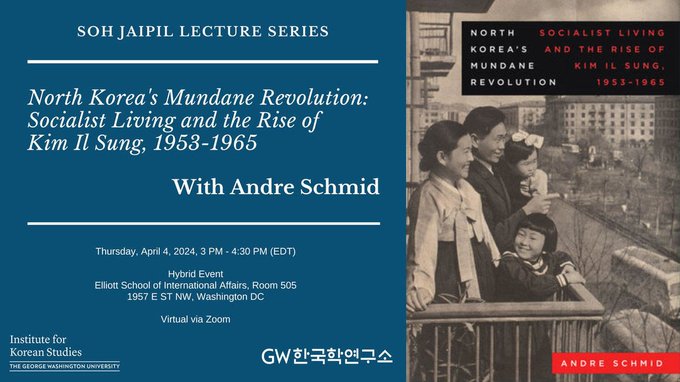time zone will be applied.
Report this post?

Guests who register for the virtual ticket option will receive a confirmation email with the Zoom link to join the virtual event.
This event is on the record and open to the public.
Date: Thursday, April 4 · 3 - 4:30pm EDT
Location: 1957 E St NW room 505 Washington, WA 20052 United States
Event description:
When the crucial years after the Korean War are remembered today, histories about North Korea largely recount a grand epic of revolution centering on the ascent of Kim Il Sung to absolute power. Often overshadowed in this storyline, however, are the myriad ways the Korean population participated in party-state projects to rebuild their lives and country after the devastation of the war. North Korea's Mundane Revolution traces the origins of the country's long-term durability in the questions that Korean women and men raised about the modern individual, housing, family life, and consumption. Using a wide range of overlooked sources, Andre Schmid examines the formation of a gendered socialist lifestyle in North Korea by focusing on the localized processes of socioeconomic and cultural change. This style of "New Living" replaced radical definitions of gender and class revolution with the politics of individual self-reform and cultural elevation, leading to a depoliticization of the country's political culture in the very years that Kim Il Sung rose to power. The GW Institute for Korean Studies invites you to join us for this special lecture which will highlight aspects of North Korea’s origins that are often overlooked in history.
About the Speaker:
Andre Schmid has taught Korean and East Asian History at the University of Toronto for over 25 years. He is the author of Korea Between Empires, 1895-1919 and, most recently, North Korea's Mundane Revolution. Professor Schmid's research and teaching focus on 19th and 20th century Korea and East Asia, as seen in the broader context of global, comparative history. He is interested in historiography and the uses of public memory, the relation between cultural practices and political economy, gendered social history and popular social movements. His book, Korea Between Empires, 1895-1919 (Columbia University Press, 2002), received the John Whitney Hall Award of the Association of Asian Studies. He has published in various journals including the Journal of Asian Studies, American Historical Review, Yoksa Munje, South Atlantic Quarterly, International Journal of Korean Studies, and SAI among others. He has also served two terms as the Chair of the Department of East Asian Studies at the University of Toronto.
About the Moderator:
Jisoo M. Kim is Korea Foundation Associate Professor of History, International Affairs, and East Asian Languages and Literatures at George Washington University. She is Founding Director of the GW Institute for Korean Studies (2017-Present) and Founding Co-Director of the East Asia National Resource Center (2018-Present). She also serves as Editor-in-Chief of the Journal of Korean Studies (2020-Present). She specializes in gender, sexuality, law, emotions, and affect in Korean history. She is the author of The Emotions of Justice: Gender, Status, and Legal Performance in Chosŏn Korea (University of Washington Press, 2016), which was awarded the 2017 James Palais Prize of the Association for Asian Studies. She is currently working on a book project tentatively entitled Criminalizing Intimacy: Marriage, Concubinage, and Adultery Law in Korea, 1469-2015. In 2023, she received a Distinguished Research Award from the Ministry of Education in South Korea. She received her M.A., M.Phil., and Ph.D. in East Asian Languages and Cultures from Columbia University.